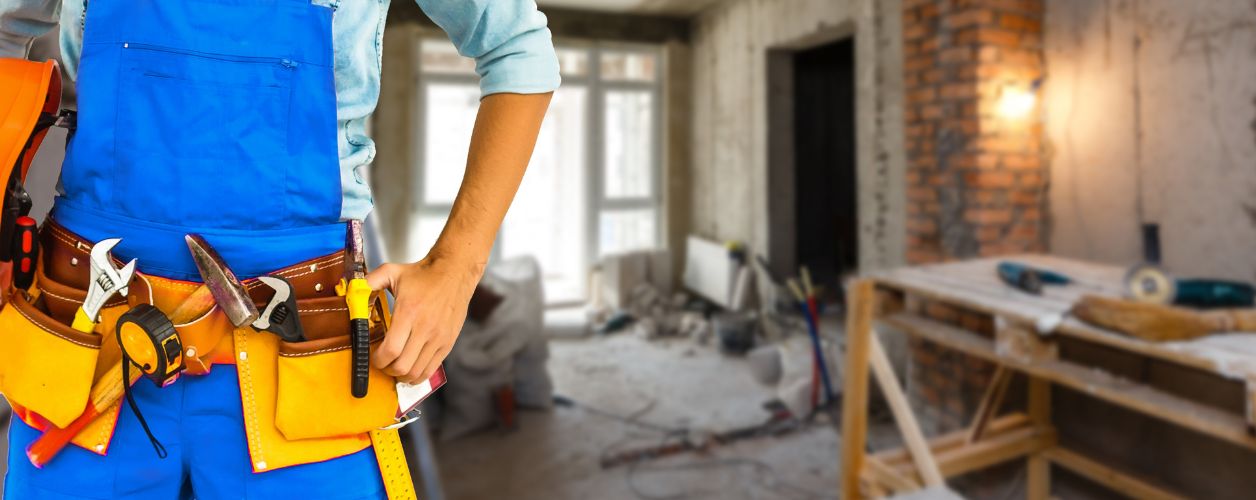Get free quotes within minutes
How to Find a Reliable Handyman Near You

Table Of Content
- Introduction
- What Does a Handyman Do?
- Why Hiring The Right Person Is Important
- When Should You Hire a Handyman?
- The Way to Start Searching for a Handyman
- Signs to Guide You in Choosing a Skilled Handyman
- Understanding Pricing: What Does a Handyman Cost?
- Comparison Between a Handyman and a Licensed Contractor
- Legal Considerations For A Handyman In the US
- How to Make a Relationship With a Handyman Successful?
- Red Flags to Watch Before Hiring Handymen
- Creating a Long-Term Maintenance Strategy
- Final Thoughts
Whether it is putting a drip stop on a leaking tap, fixing a noisy hinge, or simply dealing with a pile of domestic jobs, there is a particular expert you could count on to relieve your stress: a reliable handyman.
The problem? Acquiring a reliable handyman demands more work than you may believe.
Clickbait reviews and questionable service providers make this a time when homeowners shouldn’t settle for a quick look online. You need a strategy. We’ll demonstrate how to find a reliable handyman who is on time, skilled, honest about pricing, and polite to your home.
What Does a Handyman Do?
We'll begin with what a handyman entails. A handyman is quite experienced in attending to multiple everyday home maintenance and repair needs. They are usually unable to maintain valid licenses required for big plumbing or electrical jobs, but they can perform a wide range of home projects, for example:?
- Repairing small plumbing problems, such as leaking faucets and the plugging of drains.
- Electrical repairs (replacing outlets, installing light fixtures under kitchen wall cabinets).
- Drywall repair and painting
- Fence and deck repair
- Furniture assembly
- Installing shelves or curtain rods
- Hanging doors
- Gutter cleaning
- Minor carpentry
In other words, if the job is small or will not require hazardous systems like electrical or gas, a handyman will typically be capable of completing it.
Why Hiring The Right Person Is Important
Getting the wrong handyman may end up costing you a great deal, not only in terms of money. If the work is performed badly, you risk accidents, damage to the house, long delays, and one that is thoroughly unsatisfactory service.
On the contrary, the recruitment of the right handyman gives important support for your household maintenance. Your home stays in superb condition with an experienced handyman who efficiently gets to the bottom of problems, helps prevent excess damage, and gives you the peace of mind knowing help is available when you want it.
The choice of the right handyman determines the quality of work and your overall experience. Collaborating with an inexperienced or untrustworthy handyman can lead to poor work, additional repairs, or even a threat to people’s health and life.
- Cost-effective maintenance
- Improved home safety and functionality
- Reduced stress and time investment
- Recurring support of jobs that are frequent or seasonal.
- Prompt response to unexpected repairs
Working with a trusted handyman could make it much more convenient and efficient working with a handyman for households that are often busy or where homeowners do not know much about repairs.
When Should You Hire a Handyman?
It is possible to let a handyman do a variety of home repairs, instead of using a licensed professional. In many instances with household chores, hiring a handyman becomes the most suitable solution when one needs to:
- The project is manageable and does not have complex work.
- Dealing with several different kinds of maintenance jobs would benefit you.
- You require more prompt turnaround than a special contractor can arrange.
- You want to save money as opposed to hiring qualified contractors.
However, the owners must know that some works of repair are regulated by law and should be carried out by a licensed contractor, especially in areas such as electrical rewiring, the repair of the gas line, the changes to buildings.
The Way to Start Searching for a Handyman
Start looking for a reliable handyman by seeking adequate information to qualify for your task. Think about the following methods to find out viable options.
Ask for Personal Recommendations
The most credible kind of advice comes from recommendations from people you know. Contact one’s friends, relatives, neighbors, or co-workers to find out if they know of any proven handyman services that they have used previously. Opinions from other people often indicate whether or not a contractor is responsible, effective, clean, and cheap.
Use Online Platforms
It is easy for you to access local handyman services through several online platforms. These include:
- Google My Business
- ServiceTasker
- Angi
- HomeAdvisor
- Thumbtack
- TaskRabbit
- Nextdoor
Take the time to read the comments carefully, for their quick response, volume of feedback, combined with the overall star ratings, and the real-life feedback from customers.
Visit Local Hardware Stores or Home Centers
Working in the hardware and home improvement stores, one commonly meets helpful and reliable handymen from the community. You can also find local business cards and flyers on notice boards in these stores.
Signs to Guide You in Choosing a Skilled Handyman
When a list of possible handymen is made, you need to carefully consider each individual or company. Discern these signs to judge a handyman's dependability and skill level:
- Proof of Insurance
A trustworthy handyman normally has general liability insurance to cover you for accidental damages to your materials or personal property. - References and Portfolio
Ask about former clients, if possible, review pictures or proof of his past jobs. Contacting former buyers is a strong method of knowing how much service and reliability they offer and their overall professionalism. - Experience and Specialization
Handymen’s skills may vary from professional to professional. Find out the level of capability the handyman has in doing the job you are hiring for. Painters and drywall specialists are not always painters and experts on carpentry or completion of outdoor tasks. - Communication and Professionalism
Assess communication responsiveness and tone. Experienced handyman replies to customer messages promptly, articulates information, and demonstrates competence regardless of the scope of the task. - Transparency in Pricing
A trustworthy handyman makes all fee charges known at the outset, including how the charges are incurred (hourly or on a project), and any other extras like materials or traveling. Always request a written estimate.
Understanding Pricing: What Does a Handyman Cost?
The cost of a handyman will be based on where you live, the complexity of the work done, the time needed, and market trends. Common pricing structures include:
Hourly Rate
- National average: $50–$100 per hour
Where major metropolitan areas and high demand occur seasonally, the costs are normally higher.
Flat Rate (Per Job)
Some operations can be measured using a single flat rate. For example:
- Mounting a TV: $80–$150
- Installing a faucet: $100–$200
- Painting a room: $250–$500
- Gutter cleaning: $100–$250
Minimum Service Charge
A lot of handymen also have a minimum fee (which is generally between $75 to $150) for the time and materials involved in getting there and basic materials. To ensure fair pricing:
- Obtain at least three estimates
- Ask for itemized breakdowns
- Clarify whether materials are included
Comparison Between a Handyman and a Licensed Contractor
A lot of homeowners ask questions related to who to hire, whether a handyman or a licensed contractor. The best option is job-dependent, subject to local laws, and dependent upon your budget. Here’s how they differ.
- Scope of Work
Handymen are good at small-to-medium cases of repairs and maintenance. This will involve: fence repairs, hanging shelves, or installing light fixtures. Licensed contractors take care of major, advanced work. These are kitchen remodeling, roof replacement, and massive plumbing or electrical work. - Licensing and Regulation
Most states leave handymen unlicensed, although this is not the case in all. However, only for regulated trades, contractors have to have licenses. This is both electrical, plumbing, and structural work. - Cost Considerations
Handymen tend to charge lower prices than contractors. They usually charge low on an hourly or flat rate. Contractors are expensive because of the need to be licensed and insured, and to have overhead. Yet they carry specialised products and may provide warranties. - Availability and Timeline
Handymen are usually easier to book at short notice. They’re ideal for quick fixes. Contractors may wait for a longer period of time. That is usual for large projects or jobs that require permits. - Choosing the Right Professional
If the job is small and easy, a handyman should be adequate. However, if it is complicated or a big systems, pay a licensed contractor. They are trained to do those jobs safely and legally. - Check with Local Authorities
Get in touch with the local building authority before you start. They can prepare you for a determination of whether or not your project requires a licensed professional.
Legal Considerations For A Handyman In the US
- Local Licensing Requirements
In certain jurisdictions, even common repair works might need a handyman license, and especially in cases when the project cost exceeds a certain limit (e.g., $500 in California). Always check with your state or city government on legal requirements. - Permit Requirements
For slightly more complicated jobs, like putting in new windows, removing walls, or constructing decks, you may require a permit. Although handymen can help you with less significant installation work, it is wise that you confirm permit obligations on your own.
How to Make a Relationship With a Handyman Successful?
Hiring the right handyman is one thing; the other is having the right handyman do the right thing. To ensure a successful project:
- Put It in Writing
Put writing even for small jobs in the scope of work, pricing, timeline, and materials needed. This avoids misunderstandings later. - Be Present (When Possible)
If possible, be at home for the job to answer questions or deal with unforeseen problems. - Inspect the Work
At the end, look at the work keenly before sending payment. Seek corrections if all is below par. - Pay Promptly
After you are satisfied with the results, pay on time as agreed. This creates goodwill and goes a long way in future availability. - Leave a Review
Help good professionals in this niche by writing honest reviews on online services or recommending them to others.
Red Flags to Watch Before Hiring Handymen
Although most handymen play by the rules, a set of red flags indicates you should think twice (or not hire at all):
- Demands for full payment up front
- No verifiable references or reviews
- No insurance or fear of documentation.
- Vague or inconsistent communication
- Atrocious offers (hidden expenses)
- Do not think twice, be lucky, and walk away if you feel like you should.
Creating a Long-Term Maintenance Strategy
Instead of engaging a handyman, for instance, for things that will require fixing besides one-off repairs, think about developing a long-term relationship to handle continuing repairs on the home. Regular seasonal visits – spring gutter cleans, winter weather proofs, and so on- can also prevent larger and more costly problems further down the road. Many homeowners have a "home maintenance register" which notes:
- Dates of completed tasks
- Contact information for reliable tradespeople
- Billing of receipts and warranties for work performed
This forward-thinking mentality helps justify home value and keeps you ready for emergencies.
Final Thoughts
Looking for a reliable handyman is a matter of diligence, clear statement, and little preparation. Yet the price is highly reliable professionals able to do tremendous amounts of work, cut your household stress, and preserve the long-term value of your property.
When applying the steps explained in this guide, you can gain high-quality service by identifying your needs, researching properly, screening candidates, and defining expectations. You can thereby establish a working relationship, which can serve your home for years to come.
Capital Cities
- Specialty Services Services in Montgomery
- Specialty Services Services in Juneau
- Specialty Services Services in Pago Pago
- Specialty Services Services in Phoenix
- Specialty Services Services in Little Rock
- Specialty Services Services in Washington, D.C.
- Specialty Services Services in Washington, D.C.
- Specialty Services Services in Washington, D.C.
- Specialty Services Services in Sacramento
- Specialty Services Services in Denver
- Specialty Services Services in Hartford
- Specialty Services Services in Dover
- Specialty Services Services in Washington, D.C.
- Specialty Services Services in Palikir
- Specialty Services Services in Tallahassee
- Specialty Services Services in Atlanta
- Specialty Services Services in Hagåtña
- Specialty Services Services in Honolulu
- Specialty Services Services in Boise
- Specialty Services Services in Springfield
- Specialty Services Services in Indianapolis
- Specialty Services Services in Des Moines
- Specialty Services Services in Topeka
- Specialty Services Services in Frankfort
- Specialty Services Services in Baton Rouge
- Specialty Services Services in Augusta
- Specialty Services Services in Majuro
- Specialty Services Services in Annapolis
- Specialty Services Services in Boston
- Specialty Services Services in Lansing
- Specialty Services Services in Saint Paul
- Specialty Services Services in Jackson
- Specialty Services Services in Jefferson City
- Specialty Services Services in Helena
- Specialty Services Services in Lincoln
- Specialty Services Services in Carson City
- Specialty Services Services in Concord
- Specialty Services Services in Trenton
- Specialty Services Services in Santa Fe
- Specialty Services Services in Albany
- Specialty Services Services in Raleigh
- Specialty Services Services in Bismarck
- Specialty Services Services in Saipan
- Specialty Services Services in Columbus
- Specialty Services Services in Oklahoma City
- Specialty Services Services in Salem
- Specialty Services Services in Ngerulmud
- Specialty Services Services in Harrisburg
- Specialty Services Services in San Juan
- Specialty Services Services in Providence
- Specialty Services Services in Columbia
- Specialty Services Services in Pierre
- Specialty Services Services in Nashville
- Specialty Services Services in Austin
- Specialty Services Services in Salt Lake City
- Specialty Services Services in Montpelier
- Specialty Services Services in Charlotte Amalie
- Specialty Services Services in Richmond
- Specialty Services Services in Olympia
- Specialty Services Services in Charleston
- Specialty Services Services in Madison
- Specialty Services Services in Cheyenne
Specialty Services Related Categories
- Antique Lamp Repair
- Antique Restoration
- Grill Assembly
- Lamp Repair
- Picture Hangers
- Aquarium Services
- Bathtub Installation
- Bathtub Refinishing
- Bathtub Repair Companies
- Bathtub Replacement
- Elevator Companies
- Grab Bar Installation
- Handrail Installers
- Handyman Services
- Home Maintenance
- Home Organizers
- Marine Services
- Radon Inspectors
- Radon Mitigation
- Sandblasting
- Septic Maintenance Companies
- Septic System Repair
- Septic Tank Cleaners
- Septic Tank Service
- Shower Installation
- Shower Repair
- Sign Makers
- Sink Refinishing
- Storm Drain Contractors
- Walk-in Tub Installers
- Leather & Vinyl Repair
- Mirror Installation






